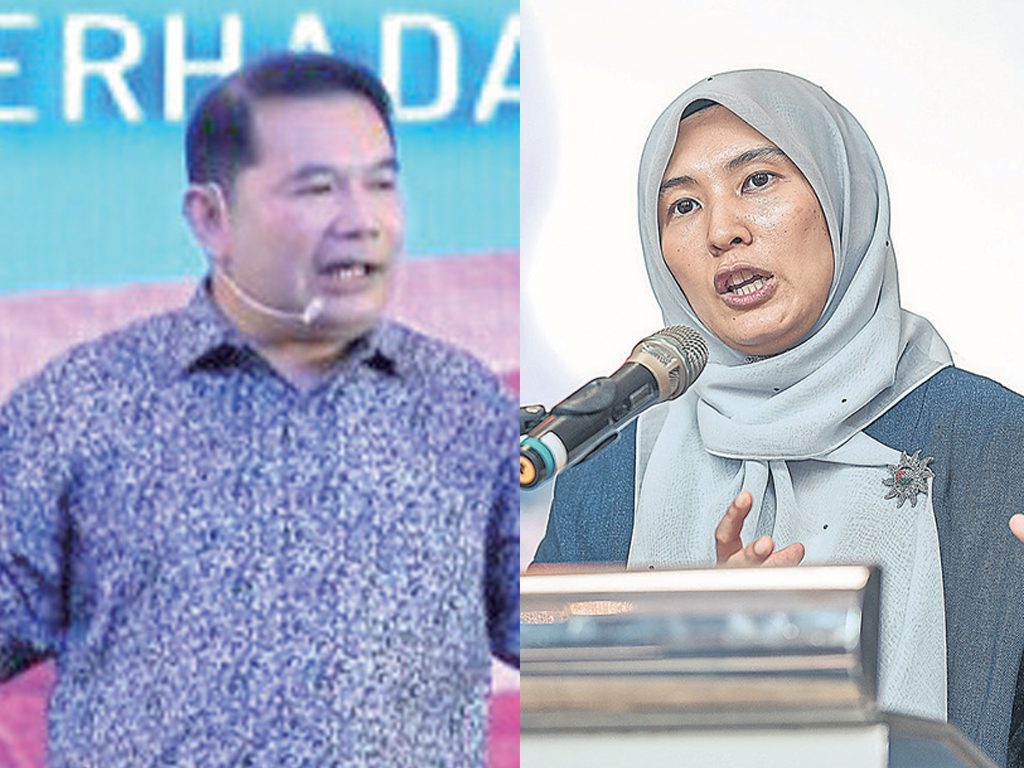
while Nurul Izzah was found wanting (Pics source: Media Mulia)
Debates and roundtables should become the norm because the public deserves to see who rises and who falters
 THE national politics is sizzling with the race for the deputy presidency of PKR, the anchor party in the broad coalition running the federal government.
THE national politics is sizzling with the race for the deputy presidency of PKR, the anchor party in the broad coalition running the federal government.
The race is between incumbent Datuk Rafizi Ramli and fellow party icon Nurul Izzah Anwar.
Rafizi is serving as economy minister under the administration of Prime Minister (PM) Datuk Seri Anwar Ibrahim. Nurul Izzah, a three-time elected VP of the party, is the daughter of Anwar, who won the president’s post uncontested.
For this article, we will not deliberate too much on the nepotism angle. As much as Nurul Izzah may want to distance herself from the shadow of her father, the optics are difficult to ignore.
This is PKR’s first internal party election after coming into power at the federal level. PKR is part of Pakatan Harapan (PH) which managed to stitch a deal with Barisan Nasional (BN) and parties from Sabah and Sarawak to helm the federal government.
And with it, comes the inevitable tension facing any party in power — positions, influence and access to resources.
Some weeks ago, Anwar suggested that the deputy president’s post should be left uncontested. At that time, rumours were rife of a tussle in the making between Rafizi and party veteran Datuk Seri Saifuddin Nasution Ismail, who is also the home minister. In the last round for a similar challenge, Rafizi emerged triumphant.
Then came the twist. The 44-year-old Nurul Izzah emerged as a candidate. While some insist her candidacy is about carrying forward “reformasi” values, others whisper that it’s less about ideology and more about control. After all, Anwar’s term as party president is constitutionally limited to two terms. Could this be a strategic move to ensure continuity?
The family’s power tentacles run deep. Anwar’s wife, Datuk Seri Dr Wan Azizah Wan Ismail, led the party during his imprisonment and later served as deputy prime minister (DPM) under Tun Dr Mahathir Mohamad. This is not merely a political dynasty; it’s a movement built around a family.
On the other side stands Rafizi, a man who has never shied away from controversy. Known for his sharp economic policies and even sharper tongue, he has certainly rattled PKR leadership and grassroots when he took to the stage on May 10 to air grievances against party leaders in public.
“Why damage the party in public? Are you creating a ruckus before going away again? We don’t want people holding the party to ransom,” said a divisional leader.
Rafizi doubled down, going on a daily campaign called Jelajah Hiruk which was shared live on social media platforms. Hiruk stands for “Hidupkan Idealisme Reformasi Dalam Ujian Kuasa”.
A few days later, Nurul Izzah’s team, known as Damai (Peace), rolled out its campaign with fanfare, drawing senior ministers and party heavyweights. But substance often took a backseat to spectacle.
Nurul Izzah herself delivered a performance that left many wanting. Despite being a seasoned speaker, she seemed unfocused, lacking clarity and conviction.For someone aiming to lead, the moment felt like a missed opportunity.
In his presentation, Rafizi shared some informative data, especially on what the party is likely to face at the next general election which must be held by February 2028.
On Rafizi’s suggestion for a debate, Nurul Izzah’s camp declined. It was not hard to see why.
In a previous joint appearance, Rafizi came across coherent and confident, presenting well thought out arguments with ease. He commanded the stage. Nurul Izzah was found wanting, almost playing second fiddle to him.
Such an outcome would be disastrous for Nurul Izzah and her team. Hence, tactically, they made the correct decision to decline Rafizi’s challenge.
But we should encourage debates and roundtable discussions among our politicians. For far too long, people have placed them on pedestals.
Debates and roundtables should become the norm. Politicians should not be shielded from scrutiny. Let them make fools of themselves if they must. The public deserves to see who rises and who falters. That is one way to sharpen the saw.
So, maybe the Rafizi-Nurul Izzah debate should happen after all. If not a one-on-one, get the contenders for the top few positions into the ring. Ayuh, PKR.
- Habhajan Singh is the corporate editor of The Malaysian Reserve.
The post The battle for PKR leadership appeared first on The Malaysian Reserve.
